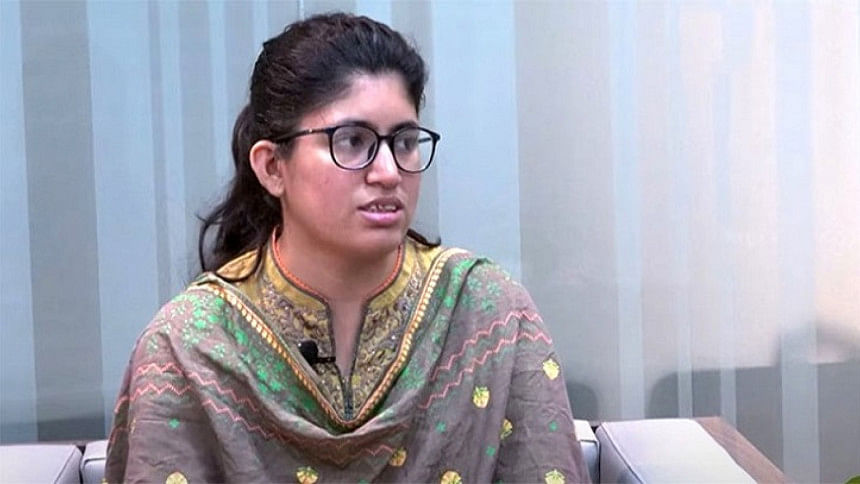Star interview: ‘We broke the fear, but not the system’

One year after the July uprising shook Bangladesh's political landscape, former student leader Umama Fatema says the movement's most significant achievement was breaking the long-standing culture of fear and silence.
She, however, says the July movement's core promises remain unfulfilled.
"We felt like something big was about to happen, and we were right in the middle of it," Umama said, recalling the night of July 14 last year when students took to the streets chanting, "Who are you? Who am I? Razakar, Razakar."
"It felt like the negative narrative about who is a true freedom fighter and who is a traitor had been shattered."
In a recent conversation with The Daily Star, Umama opened up about the emotional toll of the movement, political betrayals, exclusion from leadership spaces, and her vision for inclusive, systemic reform.
Umama was injured during the crackdown on July 15, when law enforcers opened fire on student protesters.
"When Abu Sayed gave his life by taking bullets to his chest, it struck a deep chord within us.
"It showed how deeply students had internalised the movement."
Since then, she has struggled with symptoms similar to post-traumatic stress disorder (PTSD).
"I often felt guilty, wondering if I could have done something differently to prevent the deaths.
"Every night, I had nightmares about being taken away by the DB [Detective Branch]. Many of my friends had the same dreams."
Although Umama rose to become the spokesperson for the Students Against Discrimination (SAD) after the uprising, she later resigned from both that role and from the Chhatra Federation's Dhaka University unit, where she had served as member secretary until August 5.
"I wanted to work for a bigger cause -- fighting inequality in the country," she explained.
"The federation had many good people, but internal power struggles and a lack of political urgency made me realise that I had to take a different path."
She described how she was sidelined within SAD leadership.
"Leadership should bring people together, but instead, many favoured factions based on financial or ideological ties.
"Despite raising my concerns in internal forums, I received silence or vague reassurances. Eventually, I had no role and no voice."
Umama said decisions were often made by a handful of organisers with little transparency and that women in particular were marginalised.
"Those who stayed active, like me, faced cyberbullying, harassment, and character assassination.
"I never wanted to quit. I tried to bring change from within, but after facing prolonged silence and obstruction, I realised I could not create an impact in that structure."
Reflecting on the formation of a political party by many former SAD leaders, Umama expressed disappointment.
"The public has always been sceptical of political parties because they mostly pursue their own advantage.
"Even after forming parties, many failed to focus on the structural reforms that were the core of the July movement."
She believes this shift in priorities contributed to widespread disillusionment among activists and the general public.
"Those who claimed to be the voice of the masses started manipulating power once they got close to it."
"That's where the divisions began."
One year on, there is still no official list of those injured during the uprising, nor any meaningful rehabilitation.
"The government should have listed the victims quickly, since most were admitted to hospitals at the time," Umama said. "Instead, fake claims have emerged, and rehabilitation funds remain stuck."
She also criticised what she described as arbitrary arrests and political targeting. "Some activists are harassed in their homes, while others -- known to have committed abuses -- roam freely. The justice system feels completely politicised."
In March, Umama made headlines by declining the Madeleine Albright Honorary Group Award from the United States, citing her political and ethical opposition.
"I could not accept an award from a system that supports Israeli violence against Palestinians."
"Since the October 7 Hamas-Israel conflict, I've seen the media and governments increasingly justify Israeli oppression. As someone who has always stood against imperialism, I could not be part of that narrative."
Now back to campus life, Umama is working quietly but determinedly to organise women -- especially those who played key roles in the July uprising -- and advocate for their safety and inclusion in student politics.
"My focus remains on social justice and systemic change," she said. "I am not part of any political platform right now. I'm trying to unify students, increase accountability, and properly document the movement's sacrifices."
She remains critical of those who, in her view, squandered the movement's momentum.
"This movement was built on the sacrifices of many brave people," Umama said.
"We broke the fear, but we haven't broken the system yet. That fight is far from over."

 For all latest news, follow The Daily Star's Google News channel.
For all latest news, follow The Daily Star's Google News channel. 



Comments